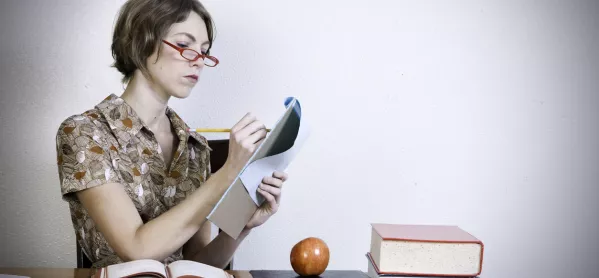Want a pay rise? Become an artisan teacher

As the recent pay freeze confirmed, there’s no extra money in becoming a modernised “blended” teacher.
No matter that most of us now have the technological skills to teach our classes at any time of the day or night, from just about anywhere in our home that you’d care to mention.
No matter, either, that many of us can now strut as confidently around Google Classroom as we can a real classroom, or that we have brought the mighty Microsoft Teams to its knees, often in a good way. No one’s going to dig deeper into their pockets just because of that. Quite the reverse.
No, if we really want to make pots of money in teaching (which is obviously what we all signed up for), we need to lose this whole idea of becoming “blended”. No one values “blended” any more. It’s regarded in the same unfavourable light as processed meat, Prince Harry and the FA Cup - a disappointing mix of the authentic with the dubious substitute.
Covid: Locally sourced artisan teachers
If we want more pay, we should follow instead the lead taken by various enterprising food-providers and craftspeople out there: we need to sell ourselves as “artisans”.
Simply by calling it an “artisan” loaf of bread, or an “artisan” lump of cheese, or by calling it a locally sourced “artisan” teacher, the price suddenly starts to be at least double what it might otherwise be.
And this is just the kind of teacher whom parents are soon going to want to see operating at their children’s schools - not some slick performer with their tablet, touch-screen presentations and recorded highlights of their greatest PowerPoint hits during lockdown.
As with their bread, beer and burgers, they are not going to want those fancy new additives. They are going to yearn for their children to be given simpler fare: something older and more organic, regardless of whether or not it’s better for them educationally.
Artisan teachers will command higher salaries (oh, spare me that “divisive” nonsense) but will be completely cost-effective for schools willing to employ and train staff in the old methods.
Not only will the “artisan” label guarantee to fill all the school’s places, but it will also enable the school to market itself as a living-crafts museum. When the current crisis is over, a nostalgic paying public will head in their droves to see 1980s’ teaching methods still alive and kicking.
The living-crafts museum of teaching
Let’s just take a glimpse at the kind of experience the paying punters might get for their entry fee (£15 a time, say?).
“Look now at one of our artisan maths teachers, Ms Webster. Note the big 1980s’ hair and the classic shoulder pads from that era. Note how she’s chalking up her equations while humming an old Spandau Ballet hit from the time.”
“Actually, I think it’s Duran Duran,” mutters one of the visitors.
“Ah, yes, you’re quite right, madam. Go to the top of the form! And now let’s all head over to science to take a look at Mr Badger in his chemistry lab. The class are gathered around to watch him perform one of his favourite demonstrations - one sadly banned in most schools nowadays - where he causes a minor nuclear explosion in the lab, scorching part of the ceiling. Just watch how those unsuspecting children jump out of their skins.”
“Meanwhile, over in French, we have stripped one of the rooms and rebuilt ye olde language lab. I bet some of us here remember a few mischievous times spent in one of those, eh?” (Quiet murmurs and chuckles.)
“And now we’ll stroll over to history and take a look at Ms Cooper, another of our artisan teachers. See how she’s marking her pupils’ projects (remember them?) by simply weighing each one on an old set of scales. That’s how they often used to be marked, back in the good old days.”
“And here’s the deputy head, Ms Grimshaw, planning next year’s entire school timetable by sticking various colour-coded pieces of felt across a huge grid on her wall, as if planning a military campaign. It’s going to take her many a month, but, ladies and gentlemen, it’s so much more personal and satisfying than using one of those fancy new computer programmes, don’t we think?” (Nods and murmurs of general agreement.)
“Artisan” may indeed be a backwards step for education, but this is what will pay our mortgage and get us away on some decent far-flung holidays again, come the day.
It’s an uncomfortable truth, but “blended” will have to go. Remember: if you want to get on, log off.
Stephen Petty is head of humanities at Lord Williams’s School in Thame, Oxfordshire
You need a Tes subscription to read this article
Subscribe now to read this article and get other subscriber-only content:
- Unlimited access to all Tes magazine content
- Exclusive subscriber-only stories
- Award-winning email newsletters
Already a subscriber? Log in
You need a subscription to read this article
Subscribe now to read this article and get other subscriber-only content, including:
- Unlimited access to all Tes magazine content
- Exclusive subscriber-only stories
- Award-winning email newsletters